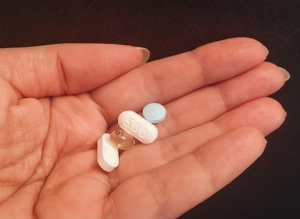Blood test could pick up diabetes five years before it develops
Published 13 Jun 2016

A simple blood test to show the chance of developing Type 2 diabetes within five years so that people could change their unhealthy lifestyles, is on the horizon.
The finger prick test, which could be available at a GPs surgery or even local chemists, looks for molecules in the blood which indicate that diabetes is developing.
Type 2 diabetes affects around 3.3 million people in England and Wales and as well as requiring daily injections of insulin, it can lead to blindness, stroke, kidney failure and limb amputation.
Yet the disease is primarily caused by poor lifestyle and changes in diet and exercise can stave off the illness before it takes hold.
Scientists hope the test will provide a crucial window of opportunity and potentially save the NHS millions of pounds in the future. Treating diabetes currently costs the health service £10 million per day.
The new diagnostic system is being created by a team at Nottingham Trent University and Cardiff University.
Currently doctors can only test for diabetes by taking blood glucose readings which show the disease is already present. People who are overweight and unfit are often warned they could develop the illness, but there are no testes that predict its onset.
The sensor is a special kind of ‘nano-material’ which works like a tiny fishing net to trap specific molecules – or biomarkers – which indicate disease.
The material produces a signal when exposed to blood containing higher than normal concentrations of certain predictor molecules, or ‘biomarkers’, which have been found to show up years before Type 2 diabetes develops.
The specific biomarkers are being kept a closely guarded secret for now, but once a prototype has been developed trials will take place to show how effective the device is for picking up early signs of diabetes.
“Due to factors such as people living longer, sedentary lifestyles and obesity, the number of people with Type 2 diabetes is growing by seven percent a year,” said Bob Stevens, Professor of Smart Materials and Devices in Nottingham Trent University’s School of Science and Technology.
“It’s hugely important that steps are taken to address this major health issue, and we have the technology here to help make a difference.
“It will probably give the result in different shades of grey. If you got light grey it might mean you should stop eating that cake, but a darker reading might show you need to do a lot more exercise.
“We will be able to give people an opportunity to change their diets, their lifestyle and make a positive impact to healthy ageing. Not everyone will be motivated to make the changes but if even 1 per cent change because of it, it could have a huge impact.
“In addition to this, the savings to the NHS could be enormous.”
Telegraph
1 comment
You will also like

Diabetes: Discrimination, Professional Life, Plan Ahead... What do patients say?
9 Nov 2018 • 13 comments
Read the article
Read the article

 Facebook
Facebook Twitter
Twitter


